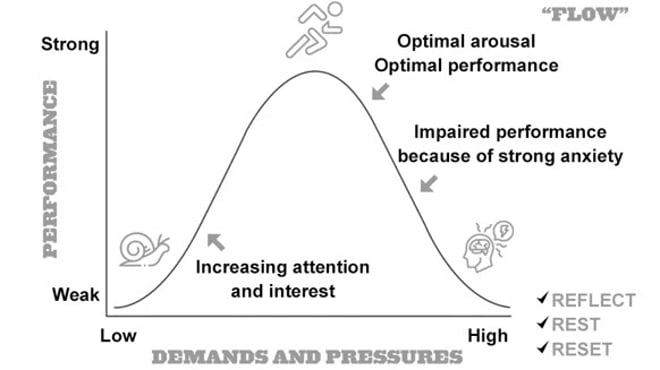Knowing your performance zone


I joined the firm as the National Mental Health Manager in September 2019. I'm very passionate about supporting mental health in the legal industry and imparting my knowledge as a Psychologist on how to forge a successful career in law whilst at the same time prioritising the essential ingredients of mental wellbeing. When I don’t have my psychologist's hat on, I love to spend time with my teenage daughter, travel the world, plane spot (aviation lover), bushwalk and drink good wine!
I want you to imagine you are an athlete whilst working hard to secure your first job! This can be a stressful and challenging experience. So exercising discipline at controlling your performance zone throughout the recruitment period while actively spending time in your recovery zone is vital to your health and wellbeing. Whilst busily applying for work, I want you to be better at the below two aspects than athletes. This is because the reality is you're spending longer than an athlete in your performance zone as you navigate this transition from university to work. Let's face it, job-seeking can be demanding and exhausting!
There are two aspects to the below diagram:
1) Controlling the zone; and
2) Getting better at managing recovery at the end of the day.

1) Controlling the zone and being in the flow of work
- We can’t afford to take our psychological wellbeing for granted. So it's important to stay in the performance zone by actively managing stress throughout the day. Research suggests that the best way to stay in the performance zone is to work/job search in 90 minute sprints. And after this time, we have to do something active to boost our energy levels and refuel our empty performance tanks. It doesn’t matter what task we are working on, taking a 10 minute break is an optimal time to rest, reflect and reset.
- Some practical examples include moving away from your desk and connecting with your friends, flatmates or family members, doing 10 minutes of pilates, yoga or circuit training, going for a walk around the block or else taking yourself off to a quiet place to do a mindfulness meditation exercise. We are not machines and the body needs time to recalibrate after 90 minute job-seeking sprints!
- If we continue to work past 90 minute intervals, we start to experience the physiological reactions of stress and anxiety throughout the body. Why? Because the fight-and-flight system becomes activated we start releasing large amounts of adrenalin. And we see an increase in the levels of stress hormone, cortisol, in our prefrontal cortex. This is an important part of the brain that gives rise to executive function. This is why we start to experience "general aches and pains", headaches, muscle tension, limited ability to concentrate and poor emotional control.
2) Getting better at managing recovery at the end of the day
- These days, our natural respite has been eroded because we are often thinking about work related activities or staying connected to work/job search activities. And this impacts our recovery. Just because we are not applying online, writing resumes, or job searching, doesn’t necessarily mean we have recovered from doing these activities throughout the day. We need to do something active to manage our recovery.
- It's not what you do - it's what you do in-between what you do - that really matters to our health and wellbeing (and humanity)! The Third Space is that moment of transition between one role or task to the next role or task. During the third space we have greater clarity, perspective and optimal mood regulation. This is what sets us up to perform at our best and stay in the "flow". It is also what allows us to reflect, rest and reset.
- Watch this great clip on The Third Space to help you better understand how to keep yourself in the Performance Zone. This can help not only when you are job-seeking, but also when you have landed your first job. It's all about how to be the best athlete when job-seeking as well as in the workplace!
3) Practical wellbeing tips when job-seeking
- Stay connected to your university mates or other friends and family
- Stay active
- Create structure and stay organised
- Take time out to refocus
- Get a restful night's sleep
- Have a positive mindset
- Keep to a healthy diet
- Practice mindfulness activities
- Learn how to breathe
- Control device usage